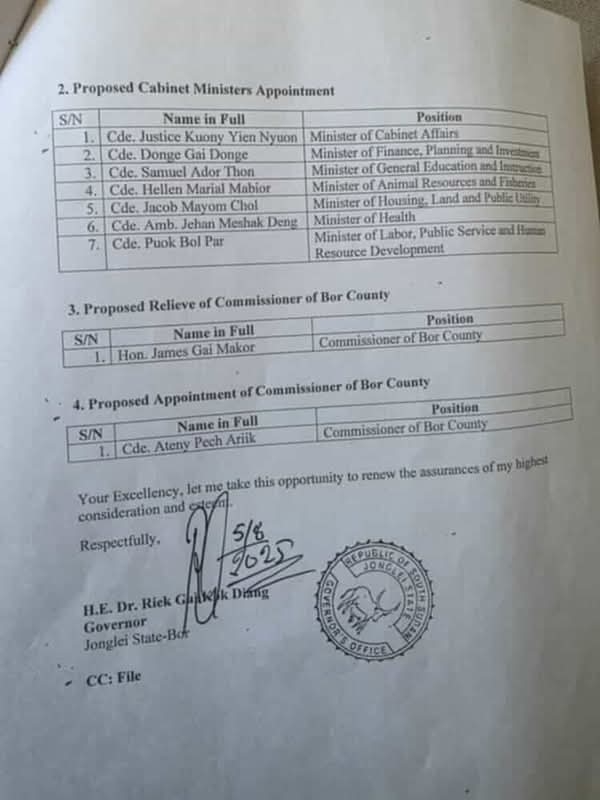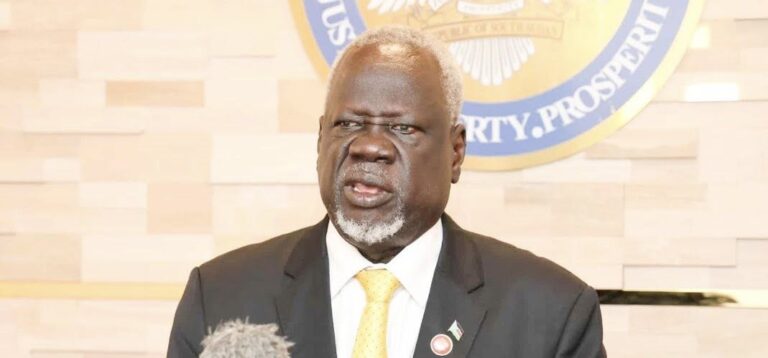South Sudanese President Salva Kiir on Wednesday evening announced a minor reshuffle in the Jonglei state government, appointing several new cabinet ministers and replacing the commissioner of Bor County.
The changes, which are the first since Riek Gai Kok was appointed governor in March 2025, affected only officials from the ruling Sudan People’s Liberation Movement (SPLM). The reshuffle followed rising tensions in the state capital, Bor, after a controversial leak of an earlier list of proposed appointees sparked public backlash.
Among those relieved of their duties were Cabinet Affairs Minister Matiop Malueth Atem, Finance Minister Abraham Rek Yuek, General Education Minister Gordon Koang Bar, Animal Resources and Fisheries Minister Sarah Peter Lul, Housing Minister Isaac Mamer Ruk, Health Minister Lual Monyluk Dau, Labour Minister Duer Nyuon Gatkuoth, and Bor County Commissioner James Gai Makor.
Their replacements include Justice Kuony Yien Nyuon as Minister of Cabinet Affairs, Donge Gai Donge as Minister of Finance, Samuel Ador Thon as Minister of General Education, Hellen Marial Mabior as Minister of Animal Resources and Fisheries, Jacob Mayom Chol as Minister of Housing, Ambassador Jahan Meshak Deng as Minister of Health, Puok Bor Par as Minister of Labour, and Ateny Pech Ariik as Commissioner of Bor County.
The appointments came after Governor Riek Gai Kok submitted a revised list of nominees to President Kiir following the leak of an earlier version on August 5. That initial list, which circulated widely on social media, proposed the removal of seven ministers and the replacement of the Bor County commissioner with Ateny Pech, a former officeholder. Despite the controversy, the final appointments reflect the leaked names, indicating no changes were made after public feedback.

Reactions among Bor residents have been mixed. Some welcomed the long-awaited changes, while others expressed concern over a perceived recycling of political elites and lack of geographic diversity in the appointments.
Ayuen Deng Kelei, a local resident, told Radio Tamazuj that the reshuffle was overdue but urged the new officials to focus on service delivery.
“These appointments have been expected for a while. We hope those appointed will work to deliver,” he said. “However, the concern is that Jonglei State belongs to everyone. There is no need to recycle officials. While I urge that the new Bor commissioner be given a chance to prove his competence — since he was initially rejected — it’s also important that commissioners be appointed from other payams of Bor, not always Makuach.”
Opiew Opiew Gilo echoed the sentiment, saying the new leadership must prioritize addressing the state’s challenges. “For a long time, we were expecting this. Our state is going through a lot. These appointees should work as a team and prioritize service delivery, peace and development,” he said.
Kenya Maxh, a women’s rights activist and resident of Bor, welcomed the representation of women in the new cabinet, noting that two female ministers were appointed in line with South Sudan’s 35 percent affirmative action policy.
“Of those appointed, the ministers of health and animal resources are women. We are happy as women,” she said. “However, opinions are divided on the new Bor commissioner. Some people, especially from northern Bor, are unhappy that no commissioner has come from their areas for years. Others are concerned about the new commissioner’s past performance. So while some are celebrating, others are worried.”
Civil society activist Bol Deng Bol, executive director of INTREPID South Sudan, also welcomed the reshuffle but warned of underlying tensions.
“While I welcome this as a normal prerogative of a new administration to appoint those who can deliver, this reshuffle is a relief because people were growing restless,” he said. “But I am concerned about how people will react to the feeling that something has been forced down their throats. Jonglei has seen several nonviolent protests in the past. There’s a real risk that public dissatisfaction could resurface.”




